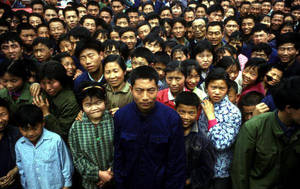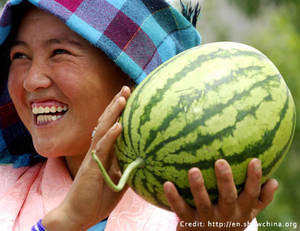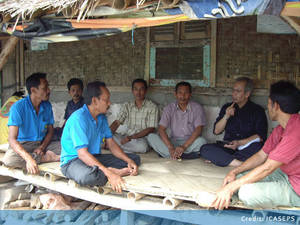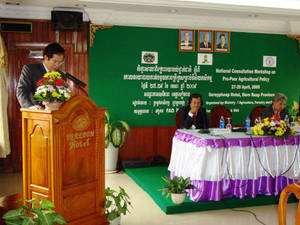Using Farmer Field Schools Approaches to Overcome Land degradation in Agro-pastoral areas of Kenya
This project extended the successful Farmer Field School approach by applying it to address land degradation problems in the Arid and Semi-arid Lands of Kenya in order to link sustainable land management (SLM) to increased agricultural productivity in agro-pastoral and pastoral landscapes.
The project worked in “landscape units” in four ASAL districts, Garissa, Kyuso, Mbeere and Narok that reflected four different land use systems in a changing socio-economic environment. In arid Garissa, where pastoralism remains the dominant land use, the challenge was to show pastoralists how livestock production can be improved by reversing land degradation. In the other districts the emphasis was on integrated crop-livestock systems and landscape management for sustaining goods and services provided by the ecosystems.
This enhanced food security and livelihoods while generating global environmental benefits. In Narok and Mbeere, the landscape units included forested hills with important environmental services being threatened. In Narok, land use has changed rapidly from pastoralism to cropping following land sub-division. Kyuso district is drier and land use consists of mixed farming. In Mbeere, agricultural potential is higher, so livestock is less important. The challenges are representative of wider areas in Kenya and in Sub Saharan Africa.
The project promoted cross-sectoral work among technical sectors and services. In particular the project supported policy harmonisation, provided an enabling environment and guides community and district capacities for SLM.
In May 2007, the Food and Agriculture Organization (FAO), with support from the International Fund for Agricultural Development (IFAD), launched a regional programme called "Pro-Poor Policy Formulation, Dialogue and Implementation at the Country Level" to assist eight Asian countries – Cambodia, China, India, Indonesia, Nepal, Pakistan, Sri Lanka and Viet Nam – to reduce rural poverty through enhanced institutional capacity to analyze, formulate and implement pro-poor agricultural and rural development policies.

Over the past three decades, the Asia-Pacific region has rescued more than 250 million poor out of the poverty trap. Progress has been uneven, however; countries with a slow pace of rural and agricultural development, and those lacking clear policies to enhance poor people’s access to productive assets and alternative livelihood opportunities, lagged behind in tackling poverty.
As a result, there are still over half-a-billion people in the region living in absolute poverty, mostly small and marginal farmers and landless workers who live in rural areas and depend on agriculture and allied activities for their subsistence.
As the 2015 deadline for achieving the Millennium Development Goals (MDGs) draws nearer, widespread poverty and hunger in the Asia-Pacific region are unacceptable and call for urgent measures. National development plans and Poverty Reduction Strategy Papers demonstrate the region’s commitment to fight poverty. However, nations’ ability to fulfill this commitment is often constrained by lack of adequate national institutional capacity to identify, formulate and implement appropriate agricultural and rural development policies.

Formulation and implementation of pro-poor policies is necessary not only to enable the poor to share the benefits of development, but also to prevent rural populations from becoming more impoverished as development processes structurally transform countries. Historical evidence from countries that have undergone complete structural transformation suggests that effective policy interventions can prevent the rural-urban productivity gap from becoming a long-term phenomenon. In the absence of policies supportive to rural and agricultural workers, there is a risk that heightened inequality may contribute to the persistence of poverty pockets and possible emergence of new social and political tensions.
In order to support the formulation and implementation of policies that reduce rural poverty, the Pro-Poor Policy Programme seeks to:
- Build capacity of key government agencies in the analysis, formulation and implementation of pro-poor policies in agricultural and rural development.
- Promote sharing of experiences and lessons learned on successful pro-poor policies;
- Promote greater civil society and private sector participation in pro-poor policy dialogue and advocacy.

In line with programme objectives, the following key activities are prioritized:
Policy analysis and formulation
- Identification of thematic areas for policy work in collaboration with national organizations.
- Review of existing agriculture and rural development policies and strategies in the context of each country’s development framework including PRSP strategy papers, MDG needs assessment, sectoral business plans and the identified thematic areas.
- Identification of policy gaps and further analytical work needed to formulate pro-poor agricultural policies in the selected thematic areas.
- Preparation of analytical reports providing recommendations for policy and institutional reforms, development of action plans for operationalization of existing pro-poor policies.
Policy Dialogue

- Facilitation of national stakeholder workshops to validate policy study findings and discuss the proposed recommendations with a view to building awareness of the policy concerns and advocacy of pro-poor policies.
- Facilitation of regional policy dialogues to promote sharing of country approaches to and experience in poverty reduction.
- Production of policy briefs and a range of other material to disseminate policy study findings.
Policy Implementation
- Capacity building in analyzing, formulating and implementing pro-poor policies in participating countries in consultation with the relevant stakeholders.
At the country level, designated national focal points (NFPs), who are senior government officials of either agricultural and rural development ministries or specialized agencies for poverty alleviation, coordinate activity implementation. The FAO Regional Office for Asia and the Pacific manages the programme at the regional level with the technical support of its Policy Assistance Branch (RAPP) and the operational support of its Regional Operations Branch (RAPR) in cooperation with the Asia and the Pacific Division of the International Fund for Agricultural Development (IFAD). Additionally, a Regional Advisory Group (RAG) provides the programme with broad policy advice and guidelines.
Between 2007 and 2009, the programme achieved the following:
1) Formulation and implementation of policies that directly address the needs and constraints of poor farmers and entrepreneurs and disadvantaged groups
- Innovative national inception workshops brought together a wide variety of stakeholders, including government ministry departments and officials, NGO and private sector organization representatives, and academic and independent experts, who identified and prioritized thematic areas for policy analysis. In total, twenty-three issues were selected across the eight programme countries. Each country’s policy analysis studies contain recommendations for policy implementation.
- The programme actively involved senior government officials as National Focal Points (NFPs) in each country. National stakeholders consider the programme relevant to their development plans and policies and many hope to institutionalize the concept of pro-poor policy focal points through regular permanent appointment to ministries once the programme concludes.
2) Enhanced capacity of key government agencies to analyse, formulate, implement and assess the impact of pro-poor agricultural and rural development policies
- Intensive training in pro-poor policy analysis for both government officials and civil society actors facilitated institutional capacity development which governments can utilize in future policy processes in any sector/sub-sector
3) Increased awareness among stakeholders in the government, the private sector and civil society of pro-poor policy concerns and advocacy of pro-poor policies
- The programme sensitized country government officials to the value of participatory and transparent policy process in improving policy content and effectiveness. In addition to the focal ministries’ direct involvement through their NFPs and other officials, seven NGOs and autonomous institutions engaged in policy analysis, which constitutes an important step towards the active involvement and participation of civil society and private sector organizations in policy formulation. In several countries, civil society institutions consulted farmers’ organizations and other ground-level actors in their policy analysis.
4) Sharing of the findings of pro-poor policy analysis and dialogue and exchanging positive experiences in and best practices for rural poverty reduction with a view to facilitating their internalization in national policies
- National stakeholder workshops have discussed and validated policy analysis conclusions and recommendations. Ministries in China and Viet Nam have already used the programme policy reports to formulate pro-poor policy.
Programme | Thematic areas of policy analysis | Lead agency for policy analysis |
|---|---|---|
Cambodia |
| |
China |
|
|
India |
|
|
Indonesia |
| |
Nepal |
|
|
Pakistan |
|
|
Sri Lanka |
|
|
Viet Nam |
|

